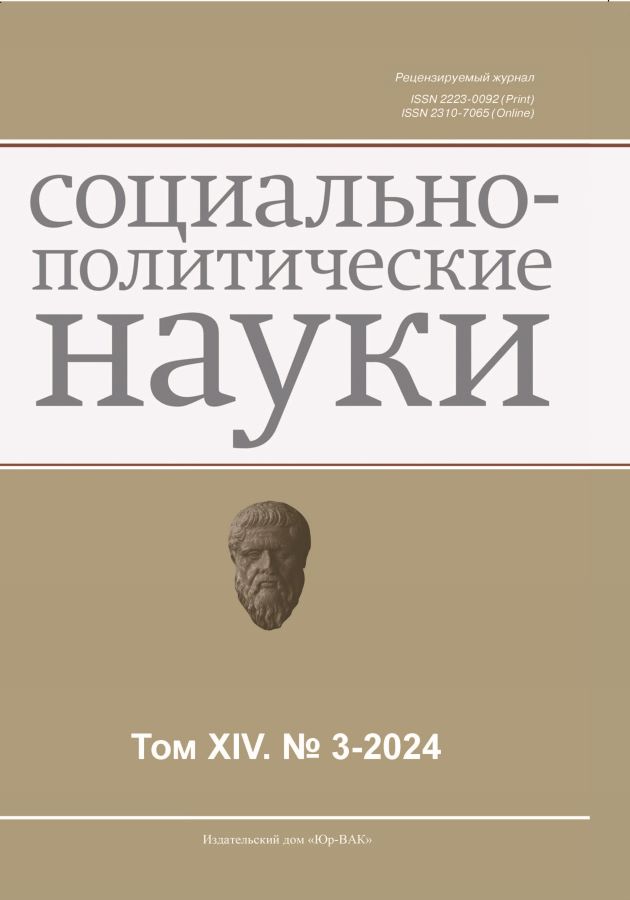Dialectical and formal-logical approach in criminal process
- 作者: Pechnikov G.A.1
-
隶属关系:
- Volgograd Academy of the Ministry of Internal Affairs of Russia
- 期: 卷 14, 编号 3 (2024)
- 页面: 89-95
- 栏目: New issues in law
- URL: https://journals.eco-vector.com/2223-0092/article/view/635473
- DOI: https://doi.org/10.33693/2223-0092-2024-14-3-89-95
- EDN: https://elibrary.ru/KONZDX
- ID: 635473
如何引用文章
详细
Purpose of the study. Show the actual existence of materialist dialectics as a general and universal objective law and as an independent science of thinking, which must be taken into account in criminal proceedings. Dialectics (dialectical logic) is opposed to formal logic, and dialectics cannot be subordinated to formal logic, considering it only as a fragment, a section of formal logic, and on this basis deny the very existence of dialectics. After all, formal logic and dialectics (dialectical logic) are two parts of a single whole. The relationship between them is dialectical. Dialectics requires a systematic approach and does not allow the erasure of differences between such systemic opposites as “goal and means”, “form and content”, “personality and objective truth”. Meanwhile, in the current adversarial Code of Criminal Procedure of the Russian Federation, the differences between these opposites are essentially erased, their systemic dialectical unity is destroyed. The article contrasts the formal-logical (tautological) prohibiting contradictions approach and the dialectical (based on dialectical contradictions) approach in relation to the criminal process.
Conclusions. As a result of the study, the author comes to the conclusion that the carrier of the formal-logical approach, in the author’s opinion, is the current adversarial Code of Criminal Procedure of the Russian Federation, in which the differences between such dialectical opposites as goal and means, form and content are actually erased, since the dominant one in this in the process, competitiveness (competition of the parties), i.e., the means, due to its self-sufficiency, (since everything is decided by the duel of the parties) excludes objective truth as the goal of the process. This destroys the systematic, truly scientific approach, which does not allow the erasure of differences between opposites. In adversarial criminal proceedings, the adversarial form is more important than the actual content. Formal legal truth in it is higher than objective truth. In fact, in the adversarial Code of Criminal Procedure of the Russian Federation there has been a “substitution of the concept” – not a complete, reliable, objectively true disclosure of crimes (the fight against crime), but the resolution of a legal dispute (conflict) of the parties of prosecution and defense (the state and the individual) who have equal rights before the court in favor of strong side. Individual rights in such a process are not absolute, but only relative value, since everything depends on the strength of the parties, and whoever is stronger is right. That is, in reality, the guilty person can win the process (case) and remain unpunished, but in reality, the innocent person can lose. In an adversarial process, everything is relative. What is necessary is an objectively true difference between the guilty and the innocent, and not an adversarial (win-lose) one. Hence, the objectively true model of the criminal process is a higher type of legal proceedings than the adversarial process. It is impossible to destroy the systemic dialectical unity of purpose and means, form and content, objective truth and personality in criminal proceedings. Dialectics as a universal pattern should be reflected in the criminal process. This is the guarantee of scientific, objectivity and true fairness of the criminal process, in contrast to the justice of the strongest in adversarial criminal proceedings (Code of Criminal Procedure of the Russian Federation). The article criticizes the theoretical position aimed at idealization, absolutization of formal logic, which does not allow contradiction, when dialectics (dialectical logic, dialectical contradiction) is considered only as a section, a fragment of formal logic. Thus, the very existence of dialectics, both as an objective law and as an independent science of thinking, is actually denied. This is something we cannot agree with. In their own way, both formal logic and dialectics (dialectical logic) are scientifically necessary. As dialectical opposites, these logics are two parts of a single whole: one is static, the other is dynamic. These logics are interconnected dialectically.
关键词
全文:
作者简介
Gennady Pechnikov
Volgograd Academy of the Ministry of Internal Affairs of Russia
编辑信件的主要联系方式.
Email: yekaterina.oleynik.96@mail.ru
SPIN 代码: 5581-3632
Dr. Sci. (Law), Professor; Professor, Department of Criminal Procedure, Educational and Scientific Complex for Preliminary Investigation in the Internal Affairs Bodies
俄罗斯联邦, Volgograd参考
- Lenin V.I. Complete collected works. 5 ed. Vol. 29: Philosophical notebooks. Moscow: Publishing House of Political Literature. 1973. 782 p.
- Mikhailovskaya I. B. A judge’s handbook on evidence in criminal proceedings. Moscow: TK Welby; Prospekt, 2006. 192 p.
- Matuzov N.I., Malko A.V. Theory of state and law: Textbook. 4th ed., rev. and add. Moscow: Delo, 2013. 528 p.
- Azarov V.A., Revenko N.I., Kuzembaeva M.M. The function of preliminary investigation in the history, theory and practice of criminal proceedings in Russia: Monograph. Omsk: Omsk State University Publishing House, 2006. 560 p.
- Strogovich M.S. The nature of the Soviet criminal process and the principle of adversarialism. Moscow: Legal Publishing House of the People’s Commissariat of Justice of the USSR, 1939. 151 p.
- The concept of judicial reform in the Russian Federation. S.A. Pashin (comp.). Moscow: Republic, 1992. 111 p.
- Luneev V.V. The era of globalization and crime: Monograph. Moscow: Norma: Infra-M, 2015. 272 p.
- Ivin A.A. Dialectics. From origin to triumph and collapse: Monograph. Moscow: Prospekt, 2023. 240 p.
- Ivin A.A. What is dialectics. Essays on philosophical polemics. Moscow: Prospekt, 2023. 192 p.
- Lenin V.I. Complete collected works. 5 ed. Vol. 42, 1970. 606 p.
补充文件








